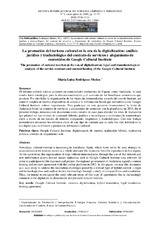La promoción del turismo cultural en la era de la digitalización: análisis jurídico y traductológico del contrato de servicios y alojamiento de contenidos de Google Cultural Institute
The promotion of cultural tourism in the era of digitalisation: legal and transductological analysis of the service contract and content hosting of the Google Cultural Institute
Autor
Rodríguez Muñoz, María Luisa
Editor
UCOPressFecha
2019Materia
Google Cultural InstituteDigitalización de museos
Traducción híbrida
Traducción jurídica
Contrato de alojamiento web
Museum digitalization
Hybrid translation
Legal translation
Hosting agreement
METS:
Mostrar el registro METSPREMIS:
Mostrar el registro PREMISMetadatos
Mostrar el registro completo del ítemResumen
El turismo cultural está en aumento en comunidades autónomas de España como Andalucía, lo cual resulta harto estratégico para la desestacionalización y el aumento de los beneficios económicos que produce. Por otro lado, la organización de los viajes sin intermediarios a través del uso de Internet, así como el empleo de nuevos dispositivos de acceso a la información hacen que iniciativas como Google Cultural Institute cobren importancia. Para participar en este proyecto transnacional la Junta de Andalucía firmó un contrato de servicios y alojamiento de contenido con la plataforma en 2015. En el presente trabajo, tomamos este documento como estudio de caso para abordar los retos de traducción que planteó un tipo textual de contenido híbrido, jurídico y tecnológico y analizamos la terminología clave a través de un estudio de derecho comparado, lingüístico y traductológico. Con este trabajo pretendemos reconocer los términos clave de este tipo de contrato que es cada vez más habitual en la era digital para la difusión y promoción del turismo cultural. Nowadays, cultural tourism is increasing in Andalusia, Spain, which turns out to be very strategic to seasonalization the tourism sector as a whole and raise the economic benefits it produces in this region. At the same time, the organization of trips without intermediaries through the use of the internet and new information access devices makes initiatives such as Google Cultural Institute very relevant. In order to participate in this transnational project, the regional government of Andalusia signed a content hosting and services agreement with this online platform in 2015. In this paper, we take this document as a case study to address the translation challenges posed by a textual type of hybrid content —legal and technological— and analyze its key terminology through a study of compared law and translation. Thus, we intend to recognize the most relevant terms of this type of agreements that is increasingly common in the digital era to disseminate and promote cultural tourism.

